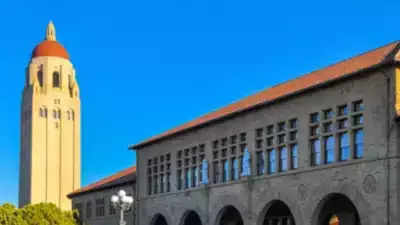

The United States has firmly established itself as a premier destination for students seeking higher education, boasting a wealth of prestigious institutions like Harvard, Yale, and Columbia. Among these, Stanford University consistently stands out as a top choice.
Officially known as Leland Stanford Junior University, Stanford is a private research institution nestled in the heart of Stanford, California.Founded in 1885 by Leland Stanford, a prominent railroad magnate and the eighth governor of California, alongside his wife, Jane Stanford, the university. was created to honor their only son, Leland Jr. When it opened its doors to students in 1891, Stanford was groundbreaking as a coeducational and non-denominational university.
Renowned for its rigorous academic programs and innovative research, Stanford University has solidified its reputation as one of the foremost institutions of higher learning in the United States. With its exceptional curriculum and vibrant campus life, gaining admission to Stanford is a dream for many aspiring students.
Stanford’s Performance at the World University Rankings 2025
Stanford University has bagged 2nd rank in the THE World University Rankings for 2025 cementing its standing as a premier institute for higher education. There are numerous parameters on which the World University Rankings are decided such as teaching and research quality, international outlook, industry impact, etc. Take a look at the rankings accomplished by the institute in each of these parameters. It will offer a comprehensive overview of why Stanford holds a stellar reputation in the academic world.
- Teaching Quality: This score reflects the university’s commitment to high-quality education, emphasizing effective teaching practices, faculty qualifications, and student engagement in the learning process.
- Research Environment (97.3): This parameter assesses the supportive infrastructure and resources available for researchers at Stanford. It considers factors such as funding, facilities, and the overall academic atmosphere conducive to groundbreaking research.
- Research Quality (99.6): This exceptional score indicates the high standard of research output at Stanford, encompassing the impact of publications, the quality of research projects, and the reputation of faculty in their respective fields.
- Industry Impact (100): This perfect score demonstrates Stanford’s strong connections with industry and its ability to translate academic research into real-world applications, highlighting the university’s influence on innovation and economic development.
- International Outlook (85.1): This metric evaluates the university’s ability to attract international students and faculty, fostering a diverse academic community and promoting global collaboration in research and education.
Stanford’s Performance at the QS Rankings 2025
Stanford has claimed the 6th rank in the QS World University Rankings 2025. It has achieved an overall score of 96.1. There are several factors that make up the QS World University Rankings 2025 such as academic reputation, faculty-student ratio, employer reputation, employment outcomes, etc. Take a look at the scores achieved by this esteemed institute in each of these parameters.
Academic Reputation (100)
Stanford University boasts a perfect score in academic reputation, reflecting its esteemed status among peers and the significant recognition of its faculty and research contributions on a global scale.
Citations per Faculty (99)
This high score indicates that Stanford faculty members are frequently cited in academic literature, showcasing the impact and relevance of their research within the scholarly community.
Faculty-Student Ratio (100)
With a perfect score in the faculty-student ratio, Stanford emphasizes personalized attention in education, ensuring that students receive ample support and guidance from experienced faculty members.
Employer Reputation (100)
Stanford’s flawless score in employer reputation highlights the university’s strong connections with industry and the high regard in which its graduates are held by employers, underscoring the effectiveness of its career preparation.
Employment Results (100)
The perfect score in employment outcomes reflects the success of Stanford graduates in securing desirable positions post-graduation, demonstrating the university’s commitment to fostering career readiness and professional development.
International Student Ratio (60.8)
This score represents the percentage of international students enrolled at Stanford, reflecting the university’s diverse and inclusive environment while also showcasing its appeal to students from around the world.
International Faculty Ratio (70.3)
The score for the international faculty ratio indicates a significant presence of global talent among Stanford’s teaching staff, enriching the academic experience and promoting diverse perspectives within the institution.
International Research Network (96.8)
Stanford’s strong score in the international research network highlights its collaborative efforts with institutions worldwide, fostering impactful research initiatives and cross-border academic partnerships.
Sustainability Score (81.2)
The sustainability score reflects Stanford’s commitment to environmentally responsible practices and initiatives aimed at promoting sustainability on campus and in research, showcasing the university’s dedication to addressing global challenges.
Why study at Stanford University?
Studying at Stanford University offers a transformative experience that goes well beyond traditional academics. While the institution is renowned for its rigorous academic programs, it also fosters vibrant campus life through diverse student organizations and extracurricular activities that promote personal growth and collaboration. Students benefit from interdisciplinary learning, allowing them to explore multiple fields and engage in innovative research projects that tackle real-world challenges. With access to cutting-edge facilities and resources, they gain hands-on experience while developing critical thinking and problem-solving skills.




